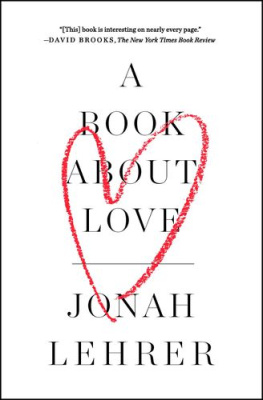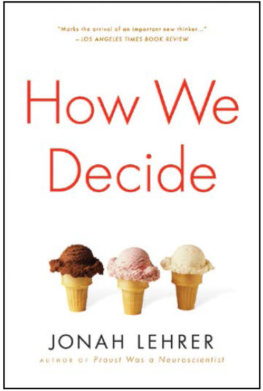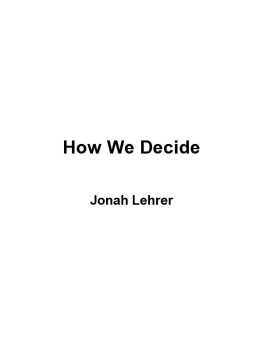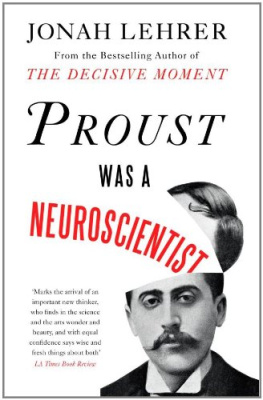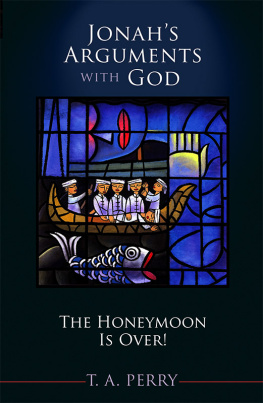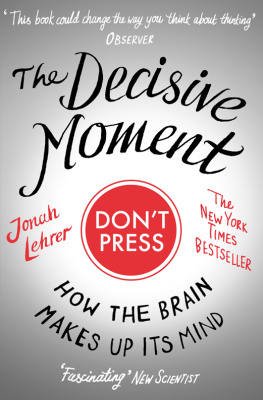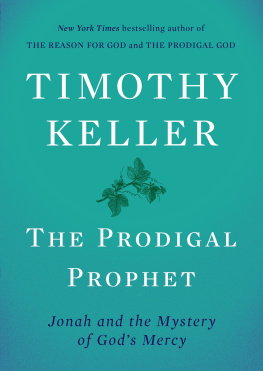Thank you for downloading this Simon & Schuster eBook.
Join our mailing list and get updates on new releases, deals, bonus content and other great books from Simon & Schuster.
C LICK H ERE T O S IGN U P
or visit us online to sign up at
eBookNews.SimonandSchuster.com
CONTENTS
... and to prove/Our almost-instinct almost true:
What will survive of us is love.
P HILIP L ARKIN , An Arundel Tomb
God breaks the heart again and again and again until it stays open.
H AZRAT I NAYAT K HAN
AUTHORS NOTE
I N EARLY A UGUST 2012, a book I wrote called Imagine was taken out of print and pulled from stores. This happened because I made several serious mistakes in the text. The worst of these mistakes involved fabricated quotes from Bob Dylan. In addition, there were passages where I relied on secondary sources that were not cited.
In the months that followed, other mistakes and failures came to light. In one instance, I plagiarized from another writer on my blog. My second book, How We Decide , was later taken out of print due to factual errors and improper citation.
I broke the most basic rules of my profession. I am ashamed of what Ive done. I will regret it for the rest of my life.
To prevent these mistakes from happening again, I have followed a few simple procedures in this book. All quotes and relevant text have been sent to subjects for their approval. This also applies to the research I describe: whenever possible, my writing has been sent to the scientists to ensure accuracy. In addition, the book has been independently fact-checked.
INTRODUCTION
Habituation
As we know, love needs re-inventing.
A RTHUR R IMBAUD
1
Two psychological laws shape much of human experience. They exist in opposition to each other.
2
The first law is habituation. Its a law of brute simplicity. When we are repeatedly exposed to a stimulusno matter what the stimuluswe gradually come to ignore it. We become desensitized to the sensation, bored by its constancy. Consider your underwear. Do you feel it? Are you conscious of it? Of course not. The garments are rubbing against some of the most sensitive nerves of the body, but youve learned to tune those signals out. The cotton has become an invisible fabric, as imperceptible as the air.
The most important implications of habituation have to do with pleasure. Although animals are programmed to seek out rewards, the law of habituation means that these rewards come with diminishing returns. Thats why the first bite of chocolate cake is better than the second, and the second is better than the third. Its why that new gadget is exciting the first few times you touch the screen, but then it becomes just another device, gathering dust in the corner. The delight always vanishes, replaced by the usual boredom and indifference.
Habituation is a phenomenon of sweeping power. Habituation is not a fact of lifein many respects, it is the fact of life. We spend our days chasing after the most fleeting things, those desires that never last.
3
But habituation does not ruin everything. There is a second law of human experience and this law is about what persists. Amid all the vanishing, some delights endure. We find joys that never disappear. We meet people who never get boring. And you know what we say about these things? We say we love them.
Here is the thesis of this book: love is the only meaning that lasts. It the opposite of underwear. It is the antithesis of chocolate cake. It is not pleasure or passion or joy. Or rather, it is all those things, but it is only those things when they go on. While we typically define love in terms of its intensityit is the highest of highsthe power of the feeling can only be understood over time, for it is what time cannot destroy.
Love is just another name for what never gets old.
4
This is a strange way of thinking about love. In Shakespeares Romeo and Juliet , love is described as the most wonderful form of madness, a rapture that makes the randy teenagers say the most romantic things. The emotion is a reminder of what our nerves can do, of all the potential energy that flows along their wires. This is life as its meant to be lived: ecstatic, exultant, every detail etched permanently into the circuits of memory. To fall in love is to learn, at long last, what it is like to want another body more than weve ever wanted anything else before.
Shakespeare didnt invent this storyhe just told it better than anyone else. The basic plot is the engine of nearly every great romance, from Orpheus and Eurydice to Tristan and Isolde. Its what Paris feels when he first sees Helen and what Taylor Swift is always singing about in her pop songs.
This narrative is not just an entertaining clich. Rather, the Romeo and Juliet version of love has come to define nearly all investigations of the subject. Evolutionary biologists, for According to the scientists, love is just an excess of lust, a pleasure so intense it hijacks the mind.
But this description of lovethe Romeo and Juliet versionis woefully incomplete. It describes love as a binary state, an all-or-nothing phenomenon. This can make love seem easy, as if we just fall into the feeling and then the feeling takes care of itself. But love is a process, not a switch. And here the standard science of lovean attempt to reduce the emotion to a set of wires and ingredientsreaches its limits, since it cannot explain the mystery of loves endurance. After all, the same neurotransmitters that are the supposed source of the feeling are also known to habituate with a vengeance. The chemicals cannot explain why love abides. They cannot show us how it lasts.
That is why its not enough to describe the hormones of Romeo, or the fMRI results of Juliet. These scientific results are interesting, but that is mostly because of what they cannot reveal, of all the reality they leave out. (Loves function, E. E. Cummings once wrote, is to fabricate unknownness.)term and the everyday. It features mostly longitudinal projects, those messy attempts to track our lives and our loves over time. When Romeo meets Juliet, he speaks in poetry, his pickup lines unfolding in iambic pentameter. Its a glorious scene. Its also a fantasy. Real life is lived in prose.
This book is about real life, an attempt to detail all the hard work that love requires. Its not a memoir or a how-to manual. But it is an investigation with selfish motives, an attempt to learn about this feeling that has sustained me. When I write that love survives, even in hard times, I am not summarizing an abstract truth. I am telling you what happened to me.
My favorite part of every scientific paper comes at the end, when the researchers qualify all of their claims. Its a ritual of modesty, a way of reminding the reader that these ideas are bracketed by uncertainty, that we know so little and understand even less. So here are my caveats, most of which are blindingly obvious. Love is a vast subject; this is a small book. What I have written here would be better if I were older, if I were wiser, if I had loved more and lost more. Much of the research I write about is relatively new, which is another way of saying it might turn out to be wrong. This book dwells on aspects of love that speak to my own life. As such, it is an inherently subjective work, framed by my own memories and experiences.


